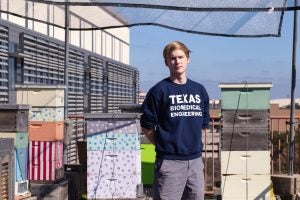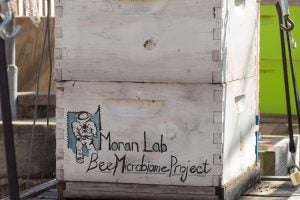When biomedical engineering major and outstanding senior from the class of 2021 Luke Heckmann first found out that his research would be published in Science, a highly prestigious multidisciplinary journal with an acceptance rate of around 7%, he almost couldn’t believe it. Such an opportunity is rare for graduate students, and for undergraduates, almost unheard of.
Heckmann recalls how he constantly checked the journal submission portal for updates and how his team originally had to enact revisions upon review and conduct multiple extra experiments to complement an already very comprehensive paper about protecting the health of bees, which are critical to our global ecosystems.
In addition to reviewing the submission portal, Heckmann also routinely checked in on the bees central to the paper’s research. Every week or so, he would ascend to the Patterson building’s rooftop terrace to survey the lab’s beehives and collect data.


“Going up to the hives was always a thrilling, but also exhaustingly hot, experience,” Heckmann says. “We would wear those big white beekeeper suits with the meshed veil to protect ourselves, and we would use smoke canisters to get the bees to fly into the hive and make it simpler to open and remove frames.”
As an undergraduate, Heckmann was part of the Moran Lab, which was investigating ways to protect honeybee health for thriving ecosystems. Researchers focused on studying a particular species of bacteria living within the bee’s guts.
While working directly with and gathering data from the bees, Heckmann edited circular rings of bacterial DNA known as plasmids. Ultimately, Heckmann and the group discovered a way to genetically modify that gut bacteria to enable the cells of bees to fight off deadly viruses and mites.
It was his biggest and proudest accomplishment yet, “taking multiple years of work and an enormous number of hours from many different people,” Heckmann says. “So it was just a huge, huge achievement for all of us really after so many years.”
Later, Heckmann even received funding from a Undergraduate Research Fellowship to further expand upon that research. And even after COVID-19 hit, he was able to continue that work remotely.
Research has formed his undergraduate experience, but Heckmann says his ultimate goal is to become a doctor. Never boxed in, he actually aspired to be an engineer growing up. He was always interested in the mechanics and moving parts of anything and everything, but in high school, Heckmann took a transformative anatomy and physiology course, opening his eyes to a future in medicine.
“It wasn’t until that anatomy class I took, where I really started seeing things from a different perspective. You sort of see that the body is almost like the most finely tuned machine,” Heckmann says.
Heckmann, born in Oklahoma but basically an Austin native after having moved here when he was 2, says it was a no-brainer applying and committing to UT Austin for its academic rigor and great location. Upon arrival, he quickly combined his interests in engineering and the natural sciences to pursue biomedical engineering.
Heckmann says some of his favorite courses were Organic Chemistry I and II, which focused on studying carbon, the building block of life, and Tumor Biology, which investigated core aspects of cancer pathology, treatment and epidemiology with molecular biosciences professor Jon Huibregtse.
Glancing over at a whiteboard in his room, he says it is filled with notes from that course. “I still have a bunch of diagrams because they’re just so satisfying to look at,” he says, laughing. “That class was incredible and really pertinent because cancer is unfortunately so common.”
As a graduating senior, Heckmann cannot recommend doing research as an undergraduate enough. “I’d honestly encourage everyone to try and seek out a research opportunity.” He says: “I learned a ton from conducting research and being a part of a lab and a group of people, or a community, if you will. A lot of things I learned in the lab weren’t even research-related, but just related to life in general.”
Looking past graduation, Heckmann is ready to bring his skills to medical school. “The great thing about UT is that it does a really good job at equipping us with different skills and different opportunities that are life-lasting. When experiments fail, I had to adapt over and over again in the face of new information, and that adaptability will be vital for me as a future physician.”
